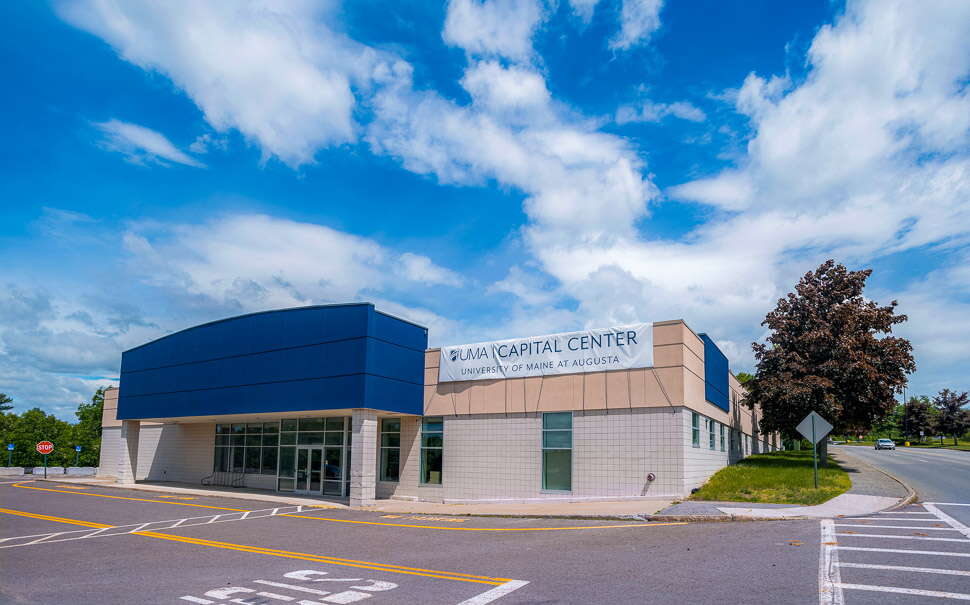
UMA’s new Capital Center will house growing nursing, cybersecurity programs
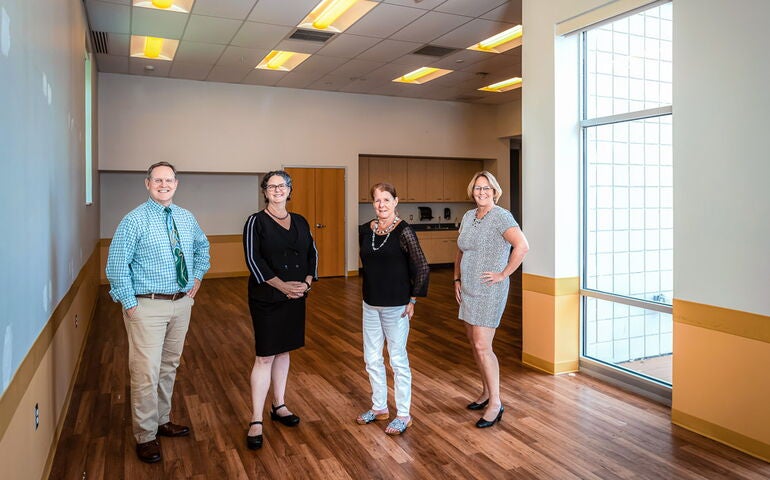 Photo / Tim Greenway
From left, Jon Henry, vice president of enrollment management and marketing; Jenifer Cushman, UMaine Augusta president; Brenda McAleer, associate provost and dean of the College of Professional Studies; and Shannon Gauvin, assistant professor and director of nursing, in what will be the student lounge where UMA is renovating space at the Marketplace for the Capital Center in Augusta
Photo / Tim Greenway
From left, Jon Henry, vice president of enrollment management and marketing; Jenifer Cushman, UMaine Augusta president; Brenda McAleer, associate provost and dean of the College of Professional Studies; and Shannon Gauvin, assistant professor and director of nursing, in what will be the student lounge where UMA is renovating space at the Marketplace for the Capital Center in Augusta
Over the past five years, enrollment in the University of Maine at Augusta’s nursing program has grown from 50 students to 320 — and demand for more training seems to be unquenchable.
Meanwhile, there’s a growing need for cybersecurity training, both for students and in the larger community.
UMA has plans underway to grow enrollment for the nursing program and to expand access to cybersecurity training, with the construction of a 20,000-square-foot facility called the UMA Capital Center.
The new center will accommodate almost 400 nursing students. It will house three patient simulator laboratories, compared with the one available now, and numerous other amenities.
A virtual security operation center called the UMA Maine Cyber Range, will move in from a smaller facility on campus.
The center will also include virtual reality capabilities, along with collaboration and community spaces.
“Having this location to expand UMA’s workforce development offerings will allow our nursing and cybersecurity to continue to grow and meet the demands of Mainers desiring a quality education in high-demand fields,” says Jenifer Cushman, UMA’s president.
Repurposed retail space
The project involves repurposing a former academic space at a shopping center called Marketplace at Augusta at 14 Marketplace Drive. The space was once occupied by a Staples store.
In 2012, it was redeveloped into classroom space for Kaplan, a for-profit university. In 2018, Kaplan was acquired by Purdue University Global, which operated there until it closed.
The existing classroom configuration and its location across from UMA’s main campus make the facility a good fit for the Capital Center, says Jonathan Henry, UMA’s vice president of enrollment management and marketing — and the person who came up with the Capital Center name, to reflect UMA as the only public university in the state’s capital.
“We were attracted to it because it was already built as an academic environment,” says Henry. “The other piece was the visibility. If you go to a movie theater or a store, you have to drive right by this place.”
The Marketplace at Augusta, Maine’s largest open-air shopping center at 1.3 million square feet, is owned and operated by Massachusetts-based mixed-use developer WS Development, which has worked out a long-term lease with UMA.
The design process is underway and it’s expected that construction could begin by this fall, with a projected opening by spring 2025.
Game-changer
The current nursing facility is in leased space at the Augusta Civic Center. It includes a nursing suite of about 8,000 square feet with a simulation laboratory that has been upgraded in recent years.
The Capital Center will provide about 12,000 square feet.
“We’ve made do at the Civic Center,” says Henry. “But this will be a game-changer for the faculty and the way they teach and for the students and the way they learn.”
A big part of the nursing program is training on high-tech patient simulators that are getting more sophisticated all the time. Simulation labs include real clinical gear, robotic, full-body simulators, simulation-specific monitoring, wireless controllers and audio-visual equipment.
The Capital Center will have three such labs — an intensive care unit room, a labor and delivery room and a medical surgical room — providing more training opportunities to run at one time rather than having to cycle students through.
“Right now we can only run one at a time,” says Shannon Gauvin, director of the UMA’s nursing program. “We’ll be able to cycle through more sections of classes, which illustrates how it will help increase enrollment.”
There will be three larger health assessment skills labs with 16 additional bed stations, and additional spaces including a medication room designed to simulate health care medication, a virtual reality lab, debrief rooms, support space, equipment storage, a large classroom and collaboration space.
Flexible programming
Gauvin and her full-time faculty worked out requirements for the new location. That included the sim labs, debriefing rooms, faculty offices, control rooms, equipment storage and collaboration space.
Maine’s nursing shortage is projected to grow to 2,700 nurses by next year. Increased nursing enrollment is needed to help mitigate Maine’s current and projected nursing shortage.
Nurses are more important than ever in Maine, as the oldest state in the nation, says Gauvin. They provide critical care not just in hospitals and health care centers, but in nursing homes, schools and communities.
The Capital Center, she says, will allow UMA “to provide high-quality, hands-on clinical training including in simulated settings to help more students cultivate the skills necessary to facilitate positive patient outcomes and graduate ready for a successful career in nursing.”
The expansion is partly due to UMA’s flexibility in how it offers the program, says Gauvin. That includes part-time students and older students who work or have families.
To accommodate distance learning, UMA has satellite locations in Ellsworth, Rockland, Brunswick and Rumford. The school also has a collaborative partnership with UMaine Farmington.
“We’re meeting people where they are,” she says.
“Say you live in Ellsworth and you plan to stay and work in Ellsworth, but you’re at a point in your life where you’ve identified that you can do something that you’ve wanted to do your whole life. But your family can’t just uproot and live in Augusta. Now these students can enroll in our nursing program in Ellsworth.”
The satellite locations are equipped with simulation labs for the program’s foundational courses. For higher-level simulation, they travel to Augusta.
“We want to make sure all the students, regardless of their location, have the same experience,” says Gauvin.
For renovation and fit-up, it’s about implementing a holistic flow that prepares students with skills in clinical practice, communication, critical thinking and writing, research and leadership.
“We approach our students in the same manner that we expect them to approach the patients they care for,” she says.
Cyber range
UMA’s cybersecurity program, at the Randall Student Center on the main campus, includes a virtual “cyber range” — essentially, a simulation lab for cybersecurity.
The program was established about 10 years ago. About five years ago, UMA acquired the cyber range, made by a company called Cyberbit.
Operating in the cloud, the range provides training opportunities as an immersive simulation center using commercially licensed security products and the National Initiative for Cybersecurity Education Workforce Framework for Cybersecurity to help them build their skills on how to best detect, respond and prevent cyber incidents.
The UMA program also received funding to work with industries and local and state government agencies to model their networks and to create custom scenarios, and then provide cybersecurity training to those industries.
For example, the technology can simulate a network that mimics the complexities of a real network, then generate attacks on and insert malware into the network.
The program is already working with municipalities and private industry and has worked with the U.S. Coast Guard in Portland. Training is conducted by master’s or fourth-year baccalaureate students, overseen by faculty. Training may be conducted at the employee worksite or at UMA.
About 3,000 square feet will be allotted to the cybersecurity program, a substantial increase from its current 150-square-foot space and an opportunity to expand employee training access.
“Most Maine municipalities have one or two IT people,’ says Brenda McAleer, UMA’s associate provost and dean of the college of professional studies who oversees the cybersecurity and the nursing programs and is on the committee working on the Capital Center renovations.
“We don’t have the resources to send people, say, to Dixfield. That IT person could maybe spend one day in Augusta, with others from other municipalities, and all train at the same time.”
About 160 students are enrolled in the cybersecurity program. Like UMA students in general, the majority are non-traditional — many work, some might want to switch careers, others already working in their company’s IT department are looking to upgrade their skills.
“We’ll grow it slowly and modestly, because we have to have qualified faculty, and finding faculty is one of our challenges,” says Henry.
The Capital Center will build on UMA’s existing capabilities, says Cushman. That includes flexible and technologically-facilitated distance-learning options, along with the ability to add programs as needed when there’s a workforce need.
“The Capital Center will build on these strengths,” says Cushman.
Says Henry, “This really helps us fast-track workforce development. Cybersecurity, nursing and other fields we offer are in high demand in Maine.”
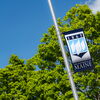
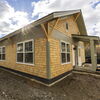




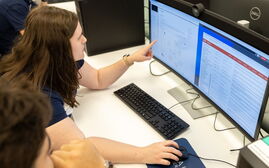
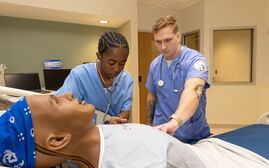

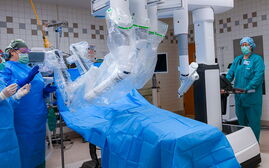




0 Comments